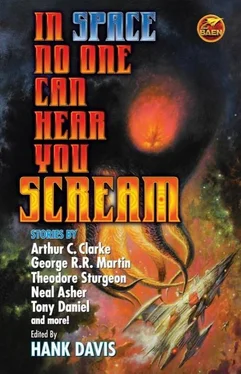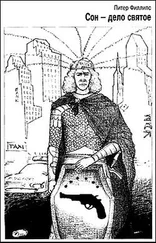Питер Филлипс - In Space No One Can Hear You Scream
Здесь есть возможность читать онлайн «Питер Филлипс - In Space No One Can Hear You Scream» весь текст электронной книги совершенно бесплатно (целиком полную версию без сокращений). В некоторых случаях можно слушать аудио, скачать через торрент в формате fb2 и присутствует краткое содержание. Город: Riverdale, NY, Год выпуска: 2013, ISBN: 2013, Издательство: Baen Books, Жанр: Фантастика и фэнтези, на английском языке. Описание произведения, (предисловие) а так же отзывы посетителей доступны на портале библиотеки ЛибКат.
- Название:In Space No One Can Hear You Scream
- Автор:
- Издательство:Baen Books
- Жанр:
- Год:2013
- Город:Riverdale, NY
- ISBN:978-1-4516-3941-4
- Рейтинг книги:4 / 5. Голосов: 1
-
Избранное:Добавить в избранное
- Отзывы:
-
Ваша оценка:
- 80
- 1
- 2
- 3
- 4
- 5
In Space No One Can Hear You Scream: краткое содержание, описание и аннотация
Предлагаем к чтению аннотацию, описание, краткое содержание или предисловие (зависит от того, что написал сам автор книги «In Space No One Can Hear You Scream»). Если вы не нашли необходимую информацию о книге — напишите в комментариях, мы постараемся отыскать её.
In Space No One Can Hear You Scream — читать онлайн бесплатно полную книгу (весь текст) целиком
Ниже представлен текст книги, разбитый по страницам. Система сохранения места последней прочитанной страницы, позволяет с удобством читать онлайн бесплатно книгу «In Space No One Can Hear You Scream», без необходимости каждый раз заново искать на чём Вы остановились. Поставьте закладку, и сможете в любой момент перейти на страницу, на которой закончили чтение.
Интервал:
Закладка:
“Either something brand new to the known solar system is going on here,” Hartigan declared, “or I’m getting as crazy as they insisted poor Stuyvesant was.”
Increased perspiration glinted on his forehead. The fear of madness in the lonelier emergency fields was a very real fear. United Spaceways had been petitioned more than once to send two men instead of one to manage each outlying field; but Spaceways was an efficient corporation with no desire to pay two men where one could handle the job.
Again, Hartigan could hear nothing at all. And in swift though unadmitted fear that perhaps the whole business had transpired only in his own brain, he sought refuge in routine. He returned to his task of testing the big doors, which was important even though dreary in its daily repetition.
The radio power unit was on, as he had left it. He closed the circuit.
Smoothly the enormous inner doors swung open on their broad tracks to reveal the equally enormous outer portals. Hartigan stepped into the big airlock and closed the inner doors. He shivered a little. It was near freezing out here in spite of the heating units.
There was a small control room in the lock, to save an operator the trouble of always getting into a space suit when the doors were opened. Hartigan entered this and pushed home the switch that moved the outer portals.
Smoothly, perfectly, their tremendous bulk opened outward. They always worked smoothly, perfectly. No doubt they always would. Nevertheless, rules said test them regularly. And it was best to live up to the rules. With characteristic trustfulness, Spaceways had recording dials in the home station that showed by power marking whether or not their planetary employees were doing what they were supposed to do.
Hartigan reversed the switch. The doors began to close. They got to the halfway mark; to the three-quarters—
Hartigan felt rather than heard the sharp, grinding jar. He felt rather than heard the high, shrill scream, a rasping shriek, almost above the limit of audibility, that was something to make a man’s blood run cold.
Still, without faltering, the doors moved inward and their serrated edges met. Whatever one of them had ground across had not been large enough to shake it.
“Jupiter!” Hartigan breathed, once more inside the huge dome with both doors closed.
He sat down to try to think the thing out.
“A smooth, round meteor falls. It looks like an egg, though it seems to be of metallic rock. As it cools, it gets lighter in color, till finally it disappears. With a loud bang, it bursts apart, and afterward I hear a sound like scurrying feet. I drop the pieces of the shell to go toward the sound, and then I hear another sound, as if something were macerating and gulping down the pieces of shell, eating them. I come back and can’t find the pieces. I go on with my test of opening and closing the main doors. As the outer door closes, I hear a crunching noise as if a rock were being pulverized, and a high scream like that of an animal in pain. All this would indicate that the meteor was a shell, and that some living thing did come out of it.
“But that is impossible.
“No form of life could live throuh the crash with which that thing struck the Moon, even though the lava ash did cushion the fall to some extent. No form of life could stand the heat of the meteor’s fall and impact. No form of life could eat the rocky, metallic shell. It’s utterly impossible!
“Or—is it impossible?”
He gnawed at his knuckles and thought of Stuyvesant.
Stuyvesant had been assigned to the emergency dome on Mercury. There was a place for you! An inferno! By miracles of insulation and supercooling systems the hangar there had been made livable. But the finest of space suits could not keep a man from frying to death outside. Nothing to do except stay cooped up inside the hangar, and pray for the six-month relief to come.
Stuyvesant had done that. And from Stuyvesant had begun to come queer reports. He thought he had seen something moving on Mercury near his landing field. Something like a rock!
Moving rocks! With the third report of that kind, the corporation had brought him home and turned him over to the board of science for examination. Poor Stuyvesant had barely escaped the lunatic asylum. He had been let out of Spaceways, of course. The corporation scrapped men suspected of being defective as quickly as they scrapped suspect material.
“When a man begins to see rocks moving, it’s time to fire him,” was the unofficial verdict.
The board of science had coldly said the same thing, though in more dignified language.
“No form of life as we know it could possibly exist in the high temperature and desert condition of Mercury. Therefore, in our judgment, Benjamin Stuyvesant suffered from hallucination when he reported some rocklike entity moving near Emergency Hangar RC10.”
Hartigan glanced uneasily toward the workbench on which the odd meteor had rested.
“No form of life as we know it .”
There was the catch. After all, this interplanetary travel was less than seventy years old. Might there not be many things still unknown to Earth wisdom?
“Not to hear the board of science tell it,” muttered Hartigan, thinking of Stuyvesant’s blasted career.
He thought of the Forbidden Asteroids. There were over two dozen on the chart on which, even in direst emergency, no ship was supposed to land. That was because ships had landed there, and had vanished without trace. Again and again. With no man able to dream of their fate. Till they simply marked the little globes “Forbidden,” and henceforth ignored them.
“No form of life as we know it!”
Suppose something savage, huge, invisible, lived on those grim asteroids? Something that developed from egg form? Something that spread its young through the universe by propelling eggs from one celestial body to another? Something that started growth by devouring its own metallic shell, and continued it on a mineral instead of vegetable diet? Something that could live in any atmosphere or temperature?
“I am going crazy,” Hartigan breathed.
In something like panic he tried to forget the affair in a great stack of books and magazines brought by the last supply ship.
The slow hours of another month ticked by. The full Earth waned, died, grew again. Drearily Hartigan went through the monotony of his routine. Day after day, the term “day” being a strictly figurative one on this drear lunar lump.
He rose at six, New York time, and sponged off carefully in a bit of precious water. He ate breakfast. He read. He stretched his muscles in a stroll. He read. He inspected his equipment. He read. He exercised on a set of homemade flying rings. He read.
“No human being should be called on to live like this,” he said once, voice too loud and brittle.
But human beings did have to live like this, if they aspired to one of the big posts on a main planet.
He had almost forgotten the strange meteor that had fallen into lava ash at his feet a month ago. It was to be recalled with terrible abruptness.
He went for a walk in a direction he did not usually take, and came upon a shallow pit half a mile from the dome.
Pits, of course, are myriad on the Moon. The whole surface is made up of craters within craters. But this pit was not typical in conformation. Most are smooth-walled and flat-bottomed. This pit was ragged, as if it had been dug out. Besides, Hartigan had thought he knew every hole for a mile around, and he did not remember ever seeing this one.
He stood on its edge looking down. There was loose rock in its uncraterlike bottom, and the loose rock had the appearance of being freshly dislodged. Even this was not unusual in a place where the vibration of a footstep could sometimes cause tons to crack and fall.
Читать дальшеИнтервал:
Закладка:
Похожие книги на «In Space No One Can Hear You Scream»
Представляем Вашему вниманию похожие книги на «In Space No One Can Hear You Scream» списком для выбора. Мы отобрали схожую по названию и смыслу литературу в надежде предоставить читателям больше вариантов отыскать новые, интересные, ещё непрочитанные произведения.
Обсуждение, отзывы о книге «In Space No One Can Hear You Scream» и просто собственные мнения читателей. Оставьте ваши комментарии, напишите, что Вы думаете о произведении, его смысле или главных героях. Укажите что конкретно понравилось, а что нет, и почему Вы так считаете.









